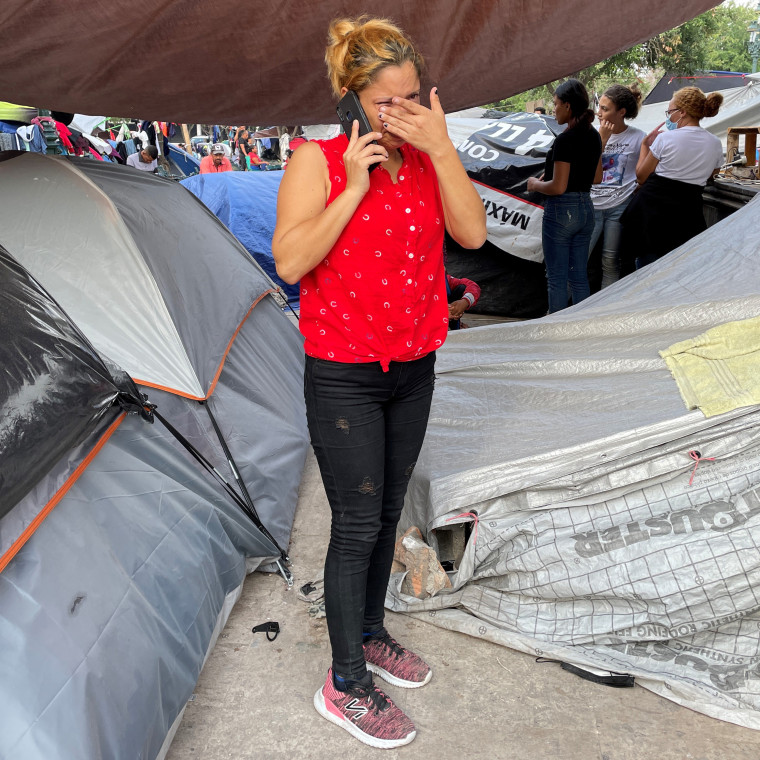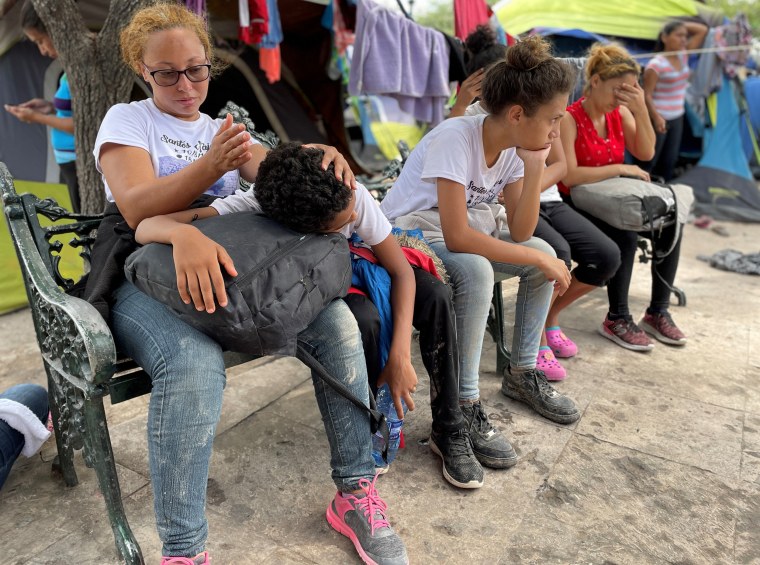REYNOSA, Mexico — Amid scorching temperatures, the number of tents grows daily in this city across the border from McAllen, Texas, as some 700 migrants, including hundreds of children, have set up camp at Plaza de la República.
Carolina wiped away tears as she shared how she and her 12-year-old daughter, Genesis, were deported from the U.S. just hours before.
“I am desperate,” she said, her emotions still raw. The pair crossed the river into McAllen the night before, on a raft packed with others seeking to migrate to the U.S. They were held for about six hours, they said, and bused back across the bridge to Reynosa.
“I don’t even have a house to live in — the hurricanes destroyed everything," Carolina said, sobbing, referring to Hurricanes Eta and Iota, which caused mass destruction in Honduras and the region.

Next to her was Jeny, a Honduran nurse who has just arrived at the camp with her two children, Fani, who is 15, and José, 11. They made it across the Rio Grande Monday night and told an agent that gangs murdered her brother and father over the last four months. A few hours later, she and her children were bused back to Mexico.
“I don’t even know how to find a tent to sleep in,” she said.

The Reynosa encampment is hardly safe for migrants escaping violence.
'No one wants to die'
Felicia Rangel-Samponaro runs Sidewalk School, a nonprofit that offers classroom instruction for asylum-seeking children in six cities across the border. She said two weeks ago at least six people were kidnapped from the plaza.
Gang members “come into the plaza,” Rangel-Samponaro said. “They drag a person away. You hear the person screaming for help. Everyone stands around and watches, which is understandable. No one wants to die.”
Rival gangs and cartels clash often in Reynosa, a city of some 600,000 people in the state of Tamaulipas. The U.S. State Department warns American travelers not to visit the city.
It’s seen a recent influx as many families are being returned to Mexico under Title 42, which was implemented by the Trump administration during Covid-19 and allows the government to turn away migrants seeking asylum for public health reasons. The Biden administration has allowed unaccompanied minors to stay — but has not done away with Title 42. Still, the Mexican state of Tamaulipas has told authorities that it will not accept families with children under 7, and some of those families have been allowed to stay in the U.S.
Compounding the human bottleneck at the border are smugglers feeding misinformation to many of the migrants, convincing them with false promises that President Joe Biden will further ease border restrictions.
The dire conditions of migrants at the plaza has prompted Rangel-Samponaro and her colleague, Victor Cavazos, to take on the job of pre-interviewing migrants to see if they qualify for asylum. Crowds surround them when they arrive at the plaza, begging for the coveted referral to immigration attorneys.
'They will wait for as long as it's necessary'
Nearby, the Senda de Vida migrant shelter is at capacity. Tents now line its interior courtyard. About 300 migrants are staying here, Pastor Hector de Silva told NBC News. He plans to expand.
"I don't see that this is going to stop just yet,”"de Silva said, adding that he’s never seen so many children here, even though he’s worked at the church for almost 24 years.
Odalys, 7, was sitting with three other children at a Reynosa shelter, sharing what her young life has been like. She was wearing a teal dress church volunteers got her.
"If I didn’t leave El Salvador, they were going to kill my mom and they were going to kill me,” she said. Odalys’ aunt Deysis lives in Virginia and said she would take care of them financially if they are allowed to join her.
They can’t go back to El Salvador, so they will wait for as long as it’s necessary to get here,” Deysis said.
Odalys has befriended another 7-year-old girl at the Reynosa shelter. Alicia left Honduras in August with her mother, Maria, and her 9-year-old brother. When they got to the U.S. border, her brother convinced his mom to let him cross into Texas alone.
“He would cry and cry, saying he wanted to see his father,” Maria said. “I did not hear from him in three days, and I was very nervous."
Unaccompanied minors with relatives in the U.S. are often allowed to stay, and he is now with his father in the New York area. But Alicia and her mother Maria have been turned back twice after crossing the Rio Grande.
"I was scared — I fell in the water," Alicia said. Maria is determined to keep trying to cross the border to reunite with the husband she has not seen in two years. She is pinning her hopes on the Biden administration.
"I know Biden is an excellent president who has helped many, many immigrants,” she said.
Many migrants on both sides of the U.S. border said Biden is the reason they are optimistic they will make it to the U.S.
Cesar, 39, from Nicaragua, made it to Roma, Texas, on a raft with a dozen others early Sunday morning.
"Because of President Biden we are here," he said. “He has an immense heart."
Cesar left his three children and wife in Nicaragua.
"Latinos are hard-working people,” he said in the English he’s learned, in the hopes of working in the U.S.
Back in the Reynosa tent camp, Rangel-Samponaro said Biden’s election is fueling at least some of the surge, because smugglers are exploiting it to convince migrants to risk everything.
“I think most of it is the perception that Biden won and now everyone can come into the U.S.”, she said. “Sadly, we're the ones that have to tell them that's not the case.”
“No one should be living out there,” she said about the camp. “This is wrong and no one should be okay with this.”
Follow NBC Latino on Facebook, Twitter and Instagram.

